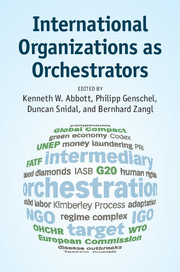Book contents
- Frontmatter
- Contents
- List of Figures
- List of Tables
- List of Contributors
- Acknowledgments
- List of Abbreviations
- Part I Introduction
- Part II Managing states
- Part III Bypassing states
- 8 WHO orchestrates?
- 9 Orchestrating peace?
- 10 Governing where focality is low
- 11 Orchestration for the “social partners” only
- 12 Orchestrating the fight against anonymous incorporation
- Part IV Implications
- References
- Index
12 - Orchestrating the fight against anonymous incorporation
a field experiment
Published online by Cambridge University Press: 05 April 2015
- Frontmatter
- Contents
- List of Figures
- List of Tables
- List of Contributors
- Acknowledgments
- List of Abbreviations
- Part I Introduction
- Part II Managing states
- Part III Bypassing states
- 8 WHO orchestrates?
- 9 Orchestrating peace?
- 10 Governing where focality is low
- 11 Orchestration for the “social partners” only
- 12 Orchestrating the fight against anonymous incorporation
- Part IV Implications
- References
- Index
Summary
Abstract
The world’s leading governments fight money laundering and terrorist financing through the intergovernmental FATF. To prevent anonymous incorporation, an important FATF rule requires that private corporate-service providers demand certified identification documents when incorporating new companies. But serious questions arise over the FATF’s effectiveness at inducing compliance with this rule. To investigate, this study employs a randomized field experiment. Using aliases and posing as consultants, we sent requests for confidential incorporation to corporate-service providers in 180 countries. We informed them about FATF rules, invoked a threat of legal penalties (hierarchy), and appealed to global norms (collaboration). A fourth condition attributed the standards to a private intermediary, the Association of Certified Anti-Money Laundering Specialists. We found that ACAMS significantly increased compliance compared to the other conditions; information about FATF rules, penalties and norms did not significantly reduce the ease of anonymous incorporation. The results measure the relative ability of an orchestrator and a complementary intermediary to affect target behavior. Together, these factors predict orchestration: a case study reveals that the FATF strongly endorses private certification bodies.
Introduction
Alarmed at the havoc wreaked by international money laundering, the Group of Seven countries created the FATF in 1989 to combat the rising threat. The FATF issues policy recommendations for governments to fight money laundering and terrorist financing. It also compiles and publishes extensive reports assessing governments’ compliance with the standards, and “blacklists” countries adjudged to be egregiously violating the rules.
- Type
- Chapter
- Information
- International Organizations as Orchestrators , pp. 286 - 312Publisher: Cambridge University PressPrint publication year: 2015
- 1
- Cited by

